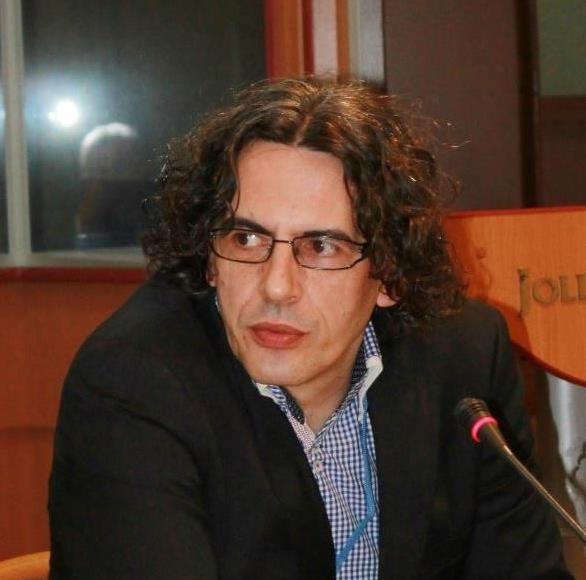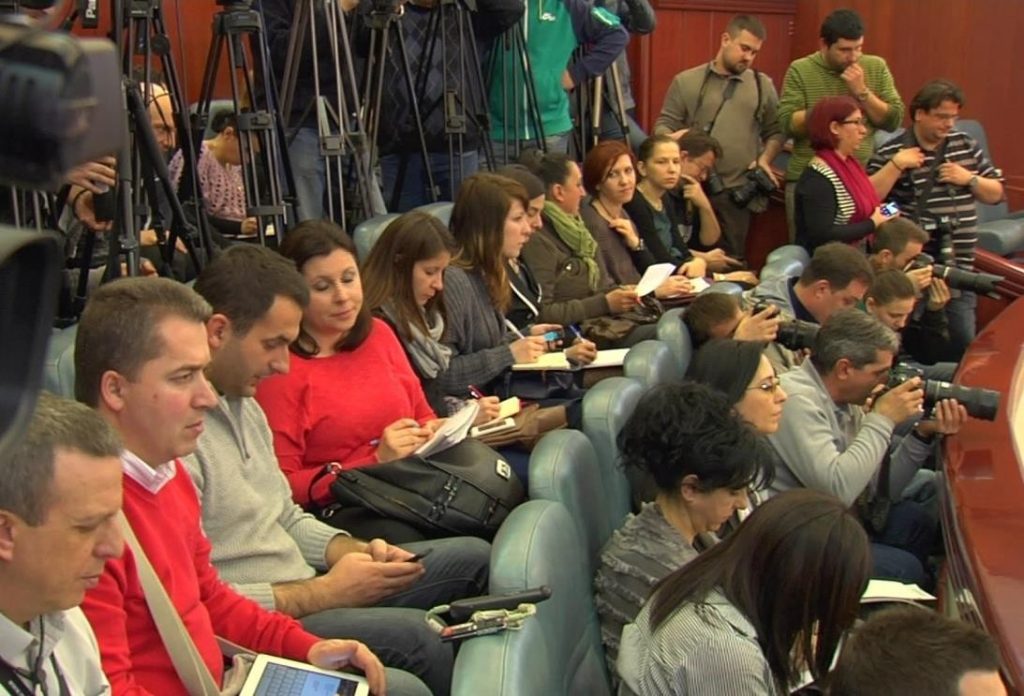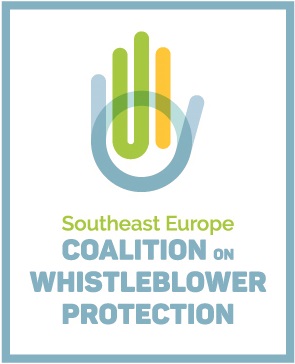Author: Mirjana Vasileva
For the needs of this story we conducted a survey with 30 journalists from print and electronic media in the country, which was conducted between November 20 and December 20, 2019. According to the results of the survey, clientelist practices and corruption in the media existed during the previous and during the present government also.

Most journalists responded affirmatively to the question of whether there were clientelistic practices in the media during the previous government. To the question “Are clientelist practices in the media space still present during this government”, 86.6% answered “yes”.
Of the three reasons used for influencing the media and journalists, the results showed that the majority of journalists consider media and individuals to be the most likely cause of funding, with a smaller number believing that it is the political pressures that are most prevalent in the media space, others cited intimidation and blackmail in the workplace. Some, however, feel the editor’s presence in terms of attempts at manipulation and of the forms of clientelism in the media. Some respondents cited the collaboration of some journalists with marketing agencies as well as government spokesmen as the main cause of clientelism by engaging in specific projects. For some, the reason lies in the impact of the international focus on editorial policy-making and the inefficiency of journalistic organizations, and for others there is nepotism.
To the extent that politics and economic centers of power influence the emergence of clientelistic practice in the media space, 60% of journalists perceive the cause of corruption among media owners, 11% say that the owners and the the journalists as well, allow political and economic power to operate. in editorial policy, but also in the pursuit of benefit, while 29% refused to respond.
Some of the journalists, or 20% of them, were offered money to publish or or not to publish a story or article, most of them, more precisely 66.7% have no such experience, while 13.3% refused to answer the question. On the question “Do you consider that journalistic work in our country is essential for the political participation of the citizen and the functioning of the society”, 73.3% stated that the profession is very important in involving the citizens in influencing decision-making, others said that journalism is not such a crucial profession.
For the reputation of the journalistic profession in society, 80% of respondents think that it is low. In response to the additional question of explaining why they report the most for the low reputation of journalists, our respondents cited the reasons, among other things: illiteracy and corruption.
Regarding the question “Are those journalists engaged in investigative journalism faced with pressures and threats”, most of the respondents consider that they are partially faced with pressures and threats.
In a survey of journalists, they were allowed the opportunity to give their assessment related to the current situation in all aspects in the media. In general, journalists believe that the media climate has improved in the last two years, but that it is far from what it should be, as long as there are media outlets that are still professional in presenting basic information, news, etc. However, there are also journalists who are truly professional and up to the high standards of the profession.
WHEN THERE IS MONEY, ANYTHING IS POSSIBLE

Is media clientelism present only in North Macedonia or is it also present in other countries in the region? This answer comes from Zagreb-based Institute for Partnerships and Social Development, which researched the extent of media clientelism in all 6 Western Balkan countries, conducted between 2014 and 2018, showed that the country is at the top of the list.
The institute’s executive director, Momir Poduvanjak, says the research was conducted within the framework of the Media Circle project, supported by EU pre-accession funds and the Civil Society Facility (CSF). He told us that the last measurement was made at the end of 2017 and that they had not entered the empirical data since the new government came to power in North Macedonia in 2016.
“The most characteristic and most visible problem for your country in 2017 is the consolidation of media ownership. Namely, a significant part of the media has fallen into the hands of the owners, with the media being a secondary activity in their business, ”says Poduvnjak.
According to him, in such a designed structure it is easy to buy media loyalty by favoring a secondary activity, which is often a business activity.
Professor Snezana Trpevska is on the same line. She says the picture of the ownership structure is more or less the same, and they are again serving the new government. “Media owners behave in the context we call clientelistic relationships, using the media to exert influence and some benefit from politics. Private media do not want to get out of the financial clientelist triangle. They want to continue serving the political elites, but that does not represent their interests in the role of public service broadcasters, ”she said.
In the section on N. Macedonia, in a report from the Poduvjnak-led
project, said the country was “falling in the Index of media clientelism,
especially as regards the ability of the state to comprehensively understand
the state of the media according to the declarative availability of data, which
means a problem in detecting and preventing clientelistic practices. “
“Full transparency of true ownership of the media is essential, as a first priority that must be addressed by all future policies governing the media space, but that comprehensive media ownership registrations, financial and material support must be available. awards the media subsidies as well as declared interests of those involved in deciding on media issues. The financial ‘support’ of the media with budgetary means has been a well-known model to all authorities in Macedonia in recent years, ”the report said.
But who is behind the media in the country? According to data obtained through the Law on Free Access to Public Information and Open Databases, most of the Macedonian televisions, radios and print media are owned by individuals.
Of the 49 television stations – only 14 are owned by legal entities, and most of them are state-run television stations. Namely, nine out of the 12state-owned televisions, four of the eighteen regional televisions and only one of the nineteen local televisions are owned by legal entities.
Almost all commercial radio stations broadcasting are owned by one or more natural persons. Legal entities own only six radio stations – one at the state level, two regional and three local radio stations. Of the 22 print media publishers, 19 are owned by one or more natural persons, and the owners of only three publishers are legal entities.
Foreign physical or legal entities are the owners of ten media outlets: four television stations (Alfa TV – from Serbia and Hungary; Kompany TV 21 – from Kosovo, Klan TV – from Albania and TV 24 News – from Austria), one radio station (RA Urban FM – from Finland and China) and five print media publishers (Repro Print and Capital Media Group – from the Virgin Islands, Free Press and Color Media – from Serbia and Independent Balkan News Agencies – from Greece).
In 2018, four legal entities and three natural persons were owners of more than one broadcaster. As of June 2019, capital integration exists only between: state-level television Chennai and regional Era TV; then state- run television Our TV and regional radio station FHM; as well as the regional TV station Uskana One and the local TV station Uskana Media and the state-level radio station Metropolis and the regional radio station City. In 2018, the Agency made a total of seven decisions approving a change in the ownership structure of three televisions and four radio stations.
WITHOUT FINANCIAL, THERE IS NO MEDIA FREEDOM
According to AJM research and the Independent Union of Journalists and Media Workers, the average journalistic salary does not even reach 300 euros. The results of the analysis show that the term “economically reliable journalist” can not even be reached in the country, as 85% of the journalists have a salary of less than 500 euros per month, and 45% have a salary lower than the national average of 376 euros. The analysis was conducted in August 2017, involving 127 media workers. The average salary in the media branch is less than 300 euros, or slightly more than 17,600 denars.
55% of the surveyed workers are late paid, while 54% of the journalists are not employed indefinitely, and 19% are temporarily employed as part-time contractors.

Professor Snezana Trpevska, too, says the worrying trend of increasing unreliable employment with part- time or part-time employment is very worrying.
“It makes the position of journalists and media workers even more difficult and more susceptible to pressure and blackmail. It is therefore our alarm that only an economically reliable and freelance journalist can produce professional media content and use the power of the journalistic community to realize that questions about how much media workers are paid and in what conditions they work is a common goal. ” she thinks.
This investigative story was produced with the financial support of the European Union. Its contents are the sole responsibility of the author and do not necessarily reflect the views of the European Union.
To be continued…





